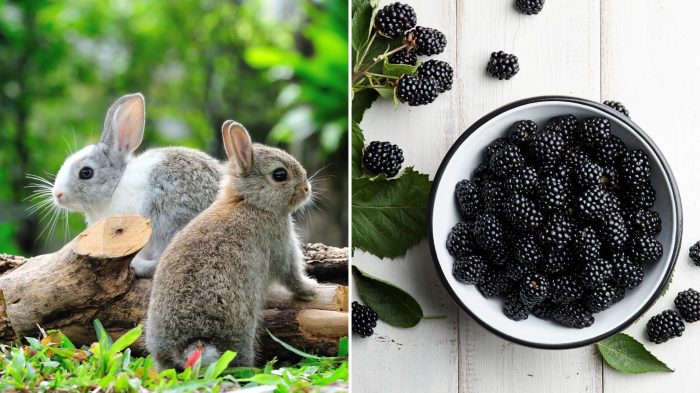Rabbits are adorable and curious creatures that bring immense joy to our lives. As responsible pet owners, it’s crucial to ensure their well-being and provide them with a healthy and balanced diet. Among the many fruits and vegetables that rabbits can enjoy, blackberries stand out as a nutritious and delectable treat.
In this comprehensive guide, we will explore the nutritional value of blackberries, establish safe consumption guidelines, discuss preparation and feeding methods, and delve into alternative berry options for your furry friend.
Blackberries are a rich source of essential nutrients that can contribute to your rabbit’s overall health and vitality. They are packed with vitamins, minerals, and antioxidants, which play vital roles in various bodily functions. Understanding the nutritional content of blackberries will help you make informed decisions about incorporating them into your rabbit’s diet.
Nutritional Value of Blackberries for Rabbits

Blackberries are a nutritious fruit that can provide rabbits with essential vitamins, minerals, and antioxidants. Here is a table outlining the nutritional content of blackberries per 100 grams:
| Nutrient | Amount |
|---|---|
| Calories | 43 |
| Carbohydrates | 10 g |
| Fiber | 5 g |
| Protein | 1 g |
| Vitamin C | 25 mg |
| Vitamin K | 19 µg |
| Manganese | 0.2 mg |
| Potassium | 162 mg |
The nutrients in blackberries provide several benefits for rabbits’ health:
- Fiber: Fiber is essential for rabbits’ digestive health. It helps to keep their digestive system moving smoothly and prevents constipation.
- Vitamin C: Vitamin C is an antioxidant that helps to protect rabbits’ cells from damage. It is also important for immune system function.
- Vitamin K: Vitamin K is essential for blood clotting and bone health.
- Manganese: Manganese is a mineral that is important for bone and cartilage health.
- Potassium: Potassium is a mineral that helps to regulate fluid balance and muscle function.
Safe Consumption Guidelines
Feeding rabbits blackberries should be done in moderation to prevent any adverse effects. The appropriate serving size for rabbits is around 1-2 tablespoons of fresh blackberries per 2 pounds of body weight, offered 2-3 times per week.
Frequency of Consumption
Rabbits can consume blackberries 2-3 times per week. This frequency allows them to enjoy the nutritional benefits of blackberries without experiencing any digestive issues.
Risks of Overconsumption
Overconsumption of blackberries can lead to digestive problems in rabbits, such as diarrhea or stomach upset. Additionally, the high sugar content in blackberries can contribute to weight gain if consumed excessively.
Preparation and Feeding Methods
Before feeding blackberries to rabbits, it’s crucial to prepare them properly to ensure their safety and maximize their nutritional value.
To prepare blackberries for rabbits, follow these steps:
- Wash thoroughly: Rinse blackberries under cold running water to remove any dirt, pesticides, or debris.
- Remove stems and leaves: Remove the stems and leaves from the blackberries, as these can be difficult for rabbits to digest.
- Cut into smaller pieces: Cut large blackberries into smaller pieces to make them easier for rabbits to eat.
Feeding Methods
Once prepared, blackberries can be fed to rabbits in various ways:
- As a treat: Offer blackberries as an occasional treat in moderation, along with other fruits and vegetables.
- Mixed into hay: Sprinkle a few chopped blackberries into your rabbit’s hay to encourage them to eat more hay.
- In a salad: Combine chopped blackberries with other rabbit-safe vegetables and fruits to create a nutritious salad.
Alternative Berry Options
Besides blackberries, several other types of berries are safe and nutritious for rabbits to eat. These include:
Blueberries
Blueberries are a good source of antioxidants, fiber, and vitamin C. They are slightly lower in sugar than blackberries.
Raspberries
Raspberries are a good source of fiber, vitamin C, and manganese. They are also a good source of antioxidants.
Strawberries
Strawberries are a good source of vitamin C, fiber, and potassium. They are also a good source of antioxidants.The nutritional value of these berries is comparable to that of blackberries. They are all good sources of fiber, vitamins, and minerals.
However, there are some slight differences in their nutritional content. For example, blueberries are higher in antioxidants than blackberries, while strawberries are higher in vitamin C.Feeding rabbits a variety of berries can provide them with a range of nutrients and antioxidants.
This can help to keep them healthy and happy.
Last Word
In conclusion, blackberries can be a healthy and enjoyable treat for rabbits when fed in moderation. By adhering to the safe consumption guidelines, preparing them properly, and exploring alternative berry options, you can provide your furry companion with a balanced and nutritious diet that supports their well-being and brings them endless joy.
Answers to Common Questions
Can rabbits eat blackberries every day?
While blackberries are a healthy treat, they should not be fed to rabbits every day. Limit blackberry consumption to once or twice a week to prevent potential digestive issues.
What are the signs of blackberry overconsumption in rabbits?
Overconsumption of blackberries can lead to digestive upset, diarrhea, and gas. If you notice these symptoms, discontinue feeding blackberries and consult with your veterinarian.
Can baby rabbits eat blackberries?
Baby rabbits should not be given blackberries until they are at least 12 weeks old and have fully transitioned to a solid diet.
What other berries can rabbits eat?
In addition to blackberries, rabbits can safely enjoy blueberries, strawberries, and raspberries. These berries offer a variety of nutrients and can be incorporated into your rabbit’s diet in moderation.